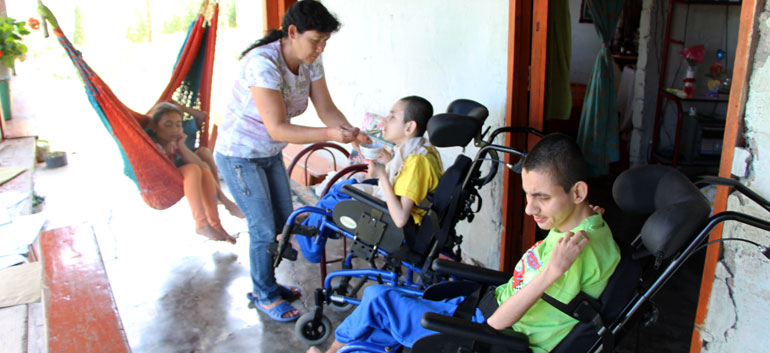The Colombian welfare system can be characterized as much by its ineffective Kafkaesque bureaucratic nature as by its neglect. Among the hills of southwestern Antioquia, in the municipality of Ciudad Bolivar, sits the small village of Farallon. There lies the tiny one-bedroom house of the Ortiz family.
Flor Ortiz is the mother of two boys with extreme cases of childhood cerebral palsy. Struggling with the constant care that she has to provide, she has been been fighting a losing battle in getting government assistance to help her support the family.
Luis Fernando, 22, and Albeiro de Jesus, 26, have spent their entire lives either in bed or in a wheelchair, and are completely dependent upon their mother. Their condition has led to severe muscle atrophy and mental impairment. Their incapacity is so extreme that they are unable to speak, walk or even understand basic sentences or gestures. Though they are in their twenties, they look like they could be as young as eleven years old.
The vice-president of the community council in Farallon, Dora Estella Cardona, has been helping Ortiz in her struggle to get help from the government in caring for her two heavily disabled sons, with little success. Since Ortiz is unable to read or write, Estella drafts and responds to the multiple letters that they have sent to both the national and regional governments, requesting that the boys be registered as incapacitated and that a payment be provided for the boys’ support and sustenance.
However, the authorities have been adept at passing consideration of the case from desk to desk, delaying any possibility that the family’s problems can be alleviated. Cardona first reached out to an office in May 2012 explaining how Ortiz’s sons are in a state of vulnerability and that they need assistance from the state urgently. But it seems that every letter they send gets a response saying that it has been referred to someone else or another office.
One of these responses gave a list of 19 reasons before concluding: “It is for this, that I am not the person in charge of the decision to determine if [your case] is included or not in the RED UNIDOS strategy.”
Finally, Ortiz received a letter rejecting any assistance. The letter said: “We are unable to agree to your request; however, the Fund stands ready to provide the services required within the parameters of law.”
The Colombian welfare system is a labyrinth of different bureaucracies like COMFAMA and RED UNIDOS, both of which purport to serve the Colombian public. RED UNIDOS was created with the aim of reducing poverty in Colombia, but involves a point system that plays a part in determining who is entitled to what. According to Cardona, Ortiz’s score in this point system makes her ineligible for assistance.
The rejection letter suggests that the privatization of state services may be part of the reason why the government is refusing to give her family support. The letter says: “Family Compensation Boxes are formed as private corporations and have a social object completely determined by the laws 21 of 1982 and 789 of 2002 and other regulations… private corporations are prevented from Family Compensation works.”
Ortiz claims that the reason for her rejection stems from the fact that she does not own a permanent residence and also that she does not make her money within the formal economy. Cardona also explained that there is a system of means testing by an organization called SISBEN that allows the state to deny assistance on the grounds of insufficient neediness.
Cardona’s attempts at making the case of the Ortiz family heard have included contacting the mayor of Cuidad Bolivar, but she has not been successful. She said, “In this country it’s impossible.”
Sources
- Interviews with Flor Ortiz and Dora Estella Cardona


